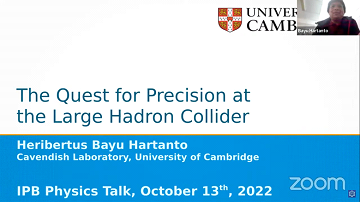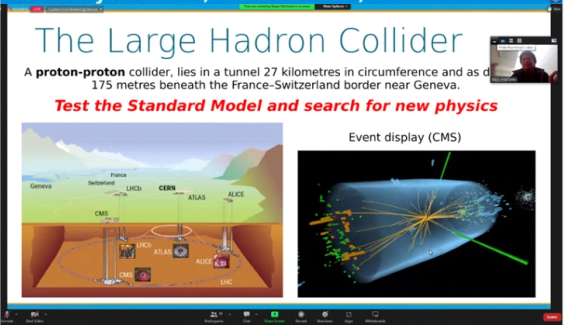
IPB University Physics Department Invites Cambridge University UK Particle Physicists to Discuss Recent Research at the Large Hadron Collider, CERN
IPB University Physics Department Invites Cambridge University UK Particle Physicists to Discuss Recent Research at the Large Hadron Collider, CERN
The Department of Physics, Faculty of Mathematics and Natural Sciences (FMIPA) IPB University again held the 38th series of IPB Physics Talk activities. This time, he invited Heribertus Bayu Hartanto, PhD who is a particle physics researcher from Cavendish Laboratory, Cambridge University, United Kingdom (UK).
Cambridge University is known as one of the world’s top universities which has produced 34 Nobel Prize winners in various fields.
Bayu Hartanto, PhD himself is an alumnus of Physics at the University of Indonesia (UI). He holds a doctorate in High Energy Theoretical Physics from Florida State University (FSU), United State of America (USA) and Post Doctoral from Durham University, UK. In front of dozens of participants who were present virtually, Bayu Hartanto, PhD delivered a material entitled “The Quest for Precision the Large Hadron Collider (LHC)”.
“The standard particle model describes the smallest matter that makes up the universe and the fundamental interactions in nature. According to the standard model, the smallest matter that makes up the universe are quarks and leptons, which are responsible for the formation of atomic nuclei, atoms, molecules, deoxyribonucleic acid (DNA), living things, planets, stars, galaxies and others,” he said.
Meanwhile, he continued, the three fundamental interactions summarized in the standard model are electromagnetic, strong nuclear and weak nuclear. One other type of interaction, namely gravity acting on a macroscopic scale and large-scale objects cannot be included in this standard particle model.
“The LHC is a laboratory facility of a European particle nuclear research consortium known as the Center Europeen pour la Recherchee Nucleaire (CERN). LHC facilitates the scattering between protons (proton collider) which has now entered the third scattering series or LHC run 3 with an installed energy of 13.6 Terra electron Volt (TeV).”
He explained that in previous runs, LHC 1 and 2, the Higgs particle was found which resulted in the 2013 Nobel Prize in Physics on behalf of François Englert and Peter W. Higgs. Through this high-energy scattering, it is hoped that the fundamental structure of matter, signaling the presence of dark matter and new physics will be discovered.
“I work on predicting the theoretical possibility of the existence of a new phenomenon from the scattering of high energy protons and comparing it directly with the LHC 3 experimental data. Deviations from theoretical calculations with experimental data open up opportunities for the emergence of new physics mechanisms that have not been discovered before, otherwise known as New Physics.” he explained.

In his presentation, Bayu clearly explained the standard model in general to the technique of calculating the cross-section of interactions at various levels, namely Leading Order, Next Leading Order (NLO), and Next to Next Leading Order (NNLO). He also demonstrated the computational calculation technique directly.
The Head of the Physics Department of FMIPA IPB University who is also a fellow FSU alumni, Prof. Tony Sumaryada in his speech expressed his joy and appreciation for Bayu’s presence in this Physics Talk this time.
“Through the Physics Talk this time, by inviting particle physics scientists from Cambridge University, it is hoped that they can inspire and motivate the younger generation of IPB University physicists to have confidence, be enthusiastic to participate in the most advanced physics research in the world in the future. Don’t be discouraged, if Pak Bayu can do it, we can all do it,” he said. (*/Rz)
This news was originally published in IPB Today


